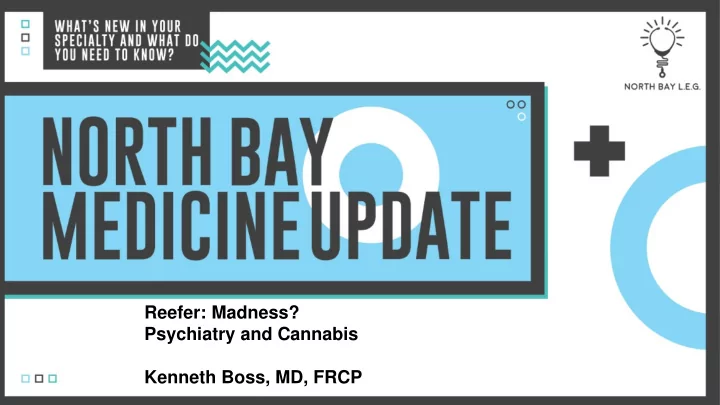

Reefer: Madness? Psychiatry and Cannabis Kenneth Boss, MD, FRCP
DISCLOSURE • Declare if you have a conflict of interest or not
OBJECTIVES 1. Identify implications of cannabis legalization on youth and young adults; 2. Counsel patients on psychiatric implications of marijuana use; 3. Describe the process for patients obtaining medical marijuana in the Nipissing District;
OUTLINE • Benefit: Marijuana as a therapeutic agent • Risk: Psychiatric comorbidity of cannabis use • Summary of CPA Position Paper “Implications of Cannabis Legalization on Youth and Young Adults” • Outline processes to obtain medicinal marijuana in the Nipissing District (time permitting) • Proposed response to patients seeking medical marijuana
MEDICAL MARIJUANA- EVIDENCE • Chronic pain and spasticity (medium) • inhaled more effective • Nausea and vomiting during chemotherapy (low) • Anorexia in HIV/AIDS (low) • Sleep disorders (low) • Tourette syndrome (low)
CANNABIS-PSYCHIATRIC COMORBIDITY • Bidirectional comorbidity between mental illness and cannabis use • Association vs causation • Secondary mental disorder • Stress-diathesis; “two hit” • Greater exposure related to later development of scz? • Secondary cannabis use disorder • “self-medication” hypothesis (not supported) • Cumulative risk/common factors hypothesis
PSYCHIATRIC COMORBIDITY:PSYCHOSIS • Psychosis • Chronic cannabis use is associated with later development of schizophrenia • Cannabis users: 2-3x rate of schizophrenia • Earlier age of onset of use, more intense use, and higher THC content strengthen scz association • Use in scz associated with relapse, rehospitalizations, positive symptoms (not negative) and poorer functioning
PSYCHIATRIC COMORBIDITY: MOOD AND ANXIETY DISORDERS • Heavy cannabis users have increased risk of developing depression (OR 1.62) • Cannabis use associated with increased risk of new-onset manic symptoms (OR 2.97) • Prospective studies show mixed results on development of anxiety disorders in marijuana use
CANNABIS- NEUROPSYCHOLOGICAL IMPACT • Acutely impairs: • Attention • Concentration • episodic memory • associative learning • Evidence of long-term impairment mixed • Some prospective studies indicate that greater intensity of use associated with greater persistence of impairment • Meta-analysis of studies showed no difference from controls after 1 month abstinence
CANNABIS USE IN ADOLESCENCE • Lower educational attainment and greater use of other drugs • No association with poor school performance or psychological health • Two recent longitudinal studies found no association with academic performance or mental health problems when corrected for current alcohol and tobacco use
CRA POSITION PAPER • Neurodevelopment continues into mid-20s • Regular usage associated with cognitive deficits • Abstinence “may improve some, but not all” of these deficits • Early regular use increases risk of developing psychotic illness “in those vulnerable” • May be associated with progression to other illicit drug use (esp. with high frequency, early use)
CPA POSITION- RECOMMENDATIONS • Age of access to cannabis should not be prior to age 21, with restrictions on quantity and THC potency for those between 21 and 25 years of age • Support for public health education and resources targeting youth and young adults • Further biological and psychosocial research on impact of cannabis and its legalization on mental health.
• Expand support for prevention, early identification and cannabis cessation treatments (i.e., using change- based treatment models including harm reduction strategies) • Advertising and marketing guidelines with clear markings of THC and cannabidiol content/consistent public health warning messaging, including potential adverse consequences of the use of cannabis during pregnancy.
WHAT TO TELL PATIENTS? • For most patients, there is inadequate evidence of benefit or harm • Up to age 25, ongoing neurodevelopment has led many to proscribe its use • Evidence of medical benefit is not strong, and does not exist for any psychiatric illness • Some vulnerable individuals may be prone to psychiatric sequelae
Recommend
More recommend